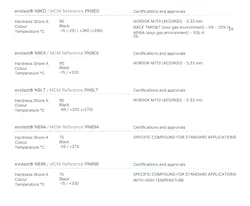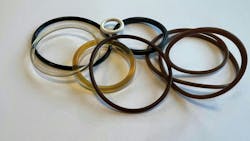How FFKM Elastomers Benefit Critical Applications
Equipment operators in critical, heavily regulated industries such as aerospace, chemical refining and processing, pharmaceutical and food processing, oil and gas, and semiconductor chip manufacturing share a common pain point — How can the elastomer materials in the O-Rings, seals, and gaskets that help keep machines running handle the increasingly aggressive requirements of their operating environments?
The short answer is Perfluoroelastomers (FFKM, by ASTM [American Society for Testing and Materials] 1418 standard), a family of chemical and heat-resistant elastomers that combine the chemical resistance of Polytetrafluoroethylene (PTFE) with the flexibility and elasticity of standard Fluorocarbon Elastomers (FKM).
Perfluoroelastomers were born out of necessity, and today, they are widely used across many industrial processes. However, there is much to consider when choosing FFKM materials because of the wide range of compounds now available.
READ MORE: Demand for O-Rings to Remain Strong
The Benefits of FFKM
FFKM is often used in applications where other polymers are unable to perform. One advantage is that FFKM are fully fluorinated and therefore contain higher amounts of fluorine than standard FKM, resulting in higher temperature ratings (up to approximately 325 C [617F]) and improved chemical resistance with nearly universal chemical compatibility. This combination makes seals manufactured in FFKM a premium choice for the industry's most demanding applications.
As mentioned, the differentiator is the compounds' recipe, typically a proprietary blend of ingredients with specific characteristics.
Take, for example, the evolast range of FFKM engineered by MCM Sealing Inc. and stocked by anyseals, which is suitable for various industries and applications. The evolast range of FFKM offers exceptional resistance to aggressive chemicals, such as acids, organic and inorganic fluids, ketones, esters, solvents, amines, hot water, and steam.
When choosing perfluoroelastomers, consider which performance attributes are required for your application. In addition, the FFKM must meet specific certifications and approvals.
How FFKM Seals are Used in Industrial Applications
The chemical processing, oil and gas, food and beverage, and semiconductor industries provide an opportunity for a closer examination of why and where FFKM can be used.
Chemical Processing
Choosing materials for equipment components is critical in the chemical processing industry, where corrosive chemicals, high temperatures, and challenging operating conditions are prevalent. FFKM materials have emerged as indispensable solutions due to their exceptional resistance to a wide range of chemicals, including acids, bases, solvents, and aggressive fluids.
FFKM materials can be versatile in the chemical process industry, from seals and gaskets to diaphragms and valve components. FFKM can withstand harsh environments, ensure process integrity, and enhance equipment reliability.
They are the material of choice for demanding applications in the chemical process industry, contributing to safety, efficiency, and productivity in various chemical manufacturing processes.
Typical chemical processing applications for FFKM parts and seals include wet chemical fluid handling, chemical etching, and heavy-duty cleaning processes.
Semiconductor Manufacturing
In the semiconductor industry, where precision, reliability, and contamination control are paramount, FFKM materials play a crucial role. FFKM materials are known for their exceptional resistance to extreme temperatures, harsh chemicals, and aggressive plasma environments, making them ideal for critical semiconductor manufacturing processes.
From sealing applications in semiconductor equipment to wafer handling, FFKM materials offer unmatched performance, ensuring the integrity of processes and minimizing downtime due to material failure. Sealing solutions show key qualities such as low plasma erosion rates, high-temperature stability, excellent resistance to various chemical processes (dry and wet), and exceptional sealing performance.
Additionally, all FFKM seals are manufactured and packaged in a cleanroom environment to maintain product purity. Typical applications include lithography machines, wafer handling machines, and wafer surface treatment machines.
Food and Beverage Processing
Every phase of converting raw goods into finished, consumable products in the food and beverage processing industry uses diverse machinery. This sector faces a series of considerable challenges in sealing.
- Extreme temperature ranges: O-Rings and seals used in the industry must withstand significant temperature variations. Sealing integrity and durability must be maintained from the icy cold storage conditions to the intense heat of cooking and sterilization processes.
- Chemical resistance: Cleaning agents and chemicals are frequently used to maintain hygiene in food processing environments. Consequently, seals must display high chemical resistance to prevent degradation that could lead to leaks and potential product contamination.
- Wear and abrasion resistance: The constant mechanical movements inherent to the operation of processing machinery demand seals with excellent wear and abrasion resistance. High-pressure techniques also contribute to the stress placed on these critical components.
- Food safety regulations: All seals used within food processing must be food-grade, non-toxic, and comply with rigorous food safety regulations. Compliance ensures the health and safety of consumers and protects manufacturers from potential legal issues related to food safety.
In summary, FFKM elastomers offer many benefits. When considering the fluids and gases interacting with elastomers in specific applications, consult materials experts engaged in engineering cutting-edge materials and certifying compounds to assess their performance.
This article was written and contributed by Aleksandra Plackovic, Business Development Manager, USA, MCM Sealing Inc. and Austin Walker, Director of Sales, anyseals, Inc.



